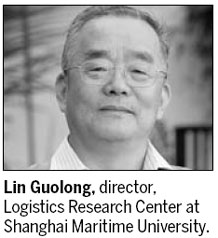

The involvement of logistics companies will be expanded throughout the China (Shanghai) Pilot Free Trade Zone in the foreseeable future, offering greater efficiency and flexibility.
Logistics companies in the FTZ will offer their services around the clock because their customers will come from all over the world. And Chinese players are expected to become some of the biggest names in the field.

Since the announcement of the pilot FTZ in July, the whole logistics sector has been looking with excitement at the sector's development prospects.
Although at this stage few detailed policies have been unveiled, many administrative hurdles and regulatory restrictions are likely to be removed, which will benefit all industries.
Both intermediary trade and offshore trade will take place in the FTZ plan, offering more chances for logistics firms to upgrade and diversify their services, while also providing tailored services to specific clients.
The central government plans to make the Shanghai FTZ a testing ground ahead of China's potential entry into the Trans-Pacific Partnership.
Covering an area of 28.78 square kilometers, the FTZ was launched at the end of September after receiving final approval from the State Council, China's cabinet, in August. It is located on the basis of existing bonded zones - Waigaoqiao Free Trade Zone, Waigaoqiao Free Trade Logistics Park, Yangshan Free Trade Port Area, and the Pudong Airport Comprehensive Free Trade Zone.
Although many analysts say it is hard to predict what changes the FTZ will bring about compared with the existing bonded areas, no one doubts that significant changes lie ahead.
Since the nation's first bonded area was set up in Waigaoqiao in 1990, more than 100 similar free trade zones or areas have been established in China. All of them are under the supervision of customs authorities, with the storage period for goods set at between two and five years.